Entrepreneurship Skills and Social Innovation
VerifiedAdded on 2020/07/22
|15
|4518
|229
AI Summary
This assignment, based on provided sources, explores the multifaceted nature of entrepreneurship. It delves into entrepreneurial learning city regions, the influence of cultural values on social entrepreneurship, leadership skills in managers, and the intersection of technology, innovation, and entrepreneurship in small businesses. The assignment also covers networking strategies for internationalizing SMEs, sustainable entrepreneurship, gender discrimination in launch decisions by women entrepreneurs, and the impact of self-leadership on entrepreneurial innovation.
Contribute Materials
Your contribution can guide someone’s learning journey. Share your
documents today.

ENTREPRENEURSHIP AND SMALL BUSINESS
MANAGEMENT
1
MANAGEMENT
1
Secure Best Marks with AI Grader
Need help grading? Try our AI Grader for instant feedback on your assignments.

Table of Contents
2
2
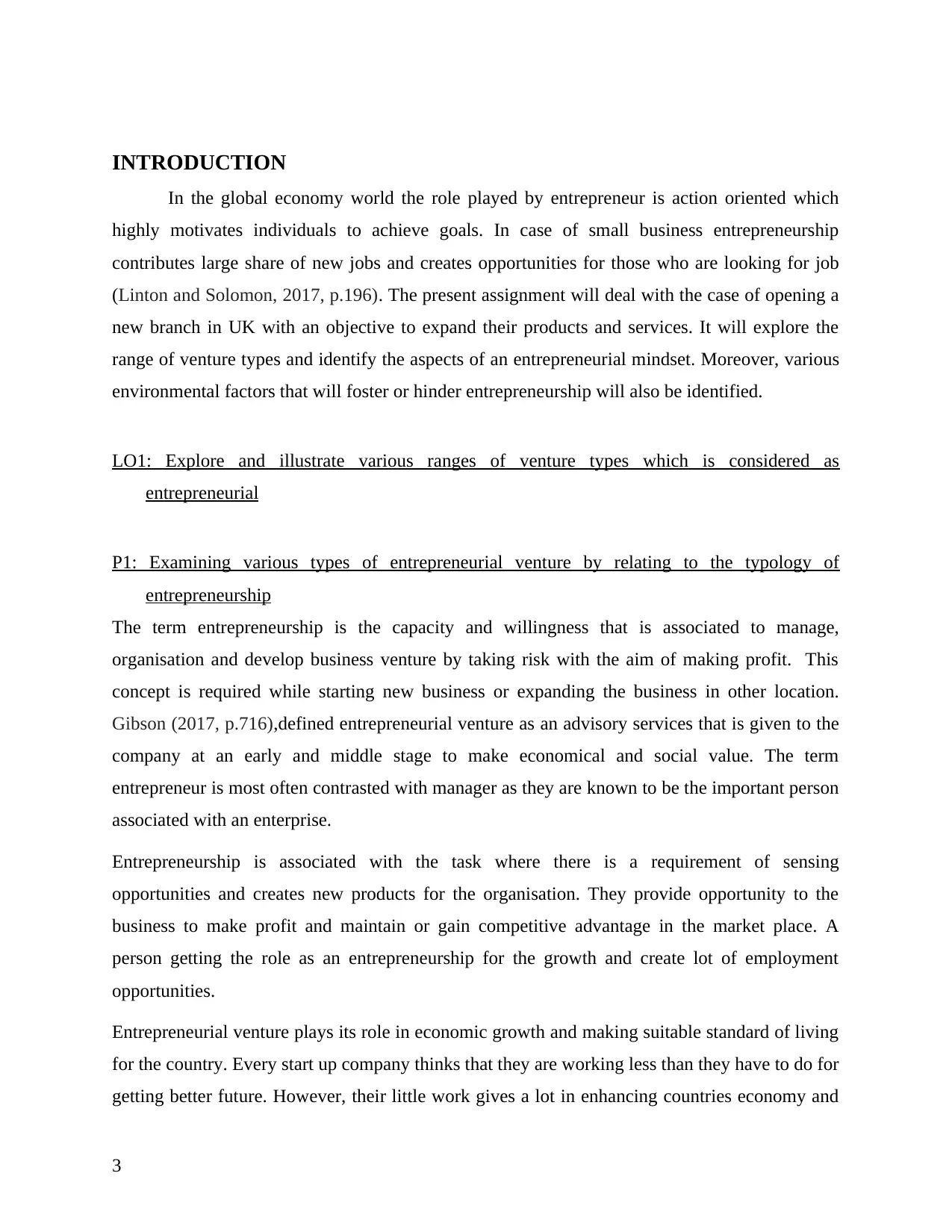
INTRODUCTION
In the global economy world the role played by entrepreneur is action oriented which
highly motivates individuals to achieve goals. In case of small business entrepreneurship
contributes large share of new jobs and creates opportunities for those who are looking for job
(Linton and Solomon, 2017, p.196). The present assignment will deal with the case of opening a
new branch in UK with an objective to expand their products and services. It will explore the
range of venture types and identify the aspects of an entrepreneurial mindset. Moreover, various
environmental factors that will foster or hinder entrepreneurship will also be identified.
LO1: Explore and illustrate various ranges of venture types which is considered as
entrepreneurial
P1: Examining various types of entrepreneurial venture by relating to the typology of
entrepreneurship
The term entrepreneurship is the capacity and willingness that is associated to manage,
organisation and develop business venture by taking risk with the aim of making profit. This
concept is required while starting new business or expanding the business in other location.
Gibson (2017, p.716),defined entrepreneurial venture as an advisory services that is given to the
company at an early and middle stage to make economical and social value. The term
entrepreneur is most often contrasted with manager as they are known to be the important person
associated with an enterprise.
Entrepreneurship is associated with the task where there is a requirement of sensing
opportunities and creates new products for the organisation. They provide opportunity to the
business to make profit and maintain or gain competitive advantage in the market place. A
person getting the role as an entrepreneurship for the growth and create lot of employment
opportunities.
Entrepreneurial venture plays its role in economic growth and making suitable standard of living
for the country. Every start up company thinks that they are working less than they have to do for
getting better future. However, their little work gives a lot in enhancing countries economy and
3
In the global economy world the role played by entrepreneur is action oriented which
highly motivates individuals to achieve goals. In case of small business entrepreneurship
contributes large share of new jobs and creates opportunities for those who are looking for job
(Linton and Solomon, 2017, p.196). The present assignment will deal with the case of opening a
new branch in UK with an objective to expand their products and services. It will explore the
range of venture types and identify the aspects of an entrepreneurial mindset. Moreover, various
environmental factors that will foster or hinder entrepreneurship will also be identified.
LO1: Explore and illustrate various ranges of venture types which is considered as
entrepreneurial
P1: Examining various types of entrepreneurial venture by relating to the typology of
entrepreneurship
The term entrepreneurship is the capacity and willingness that is associated to manage,
organisation and develop business venture by taking risk with the aim of making profit. This
concept is required while starting new business or expanding the business in other location.
Gibson (2017, p.716),defined entrepreneurial venture as an advisory services that is given to the
company at an early and middle stage to make economical and social value. The term
entrepreneur is most often contrasted with manager as they are known to be the important person
associated with an enterprise.
Entrepreneurship is associated with the task where there is a requirement of sensing
opportunities and creates new products for the organisation. They provide opportunity to the
business to make profit and maintain or gain competitive advantage in the market place. A
person getting the role as an entrepreneurship for the growth and create lot of employment
opportunities.
Entrepreneurial venture plays its role in economic growth and making suitable standard of living
for the country. Every start up company thinks that they are working less than they have to do for
getting better future. However, their little work gives a lot in enhancing countries economy and
3
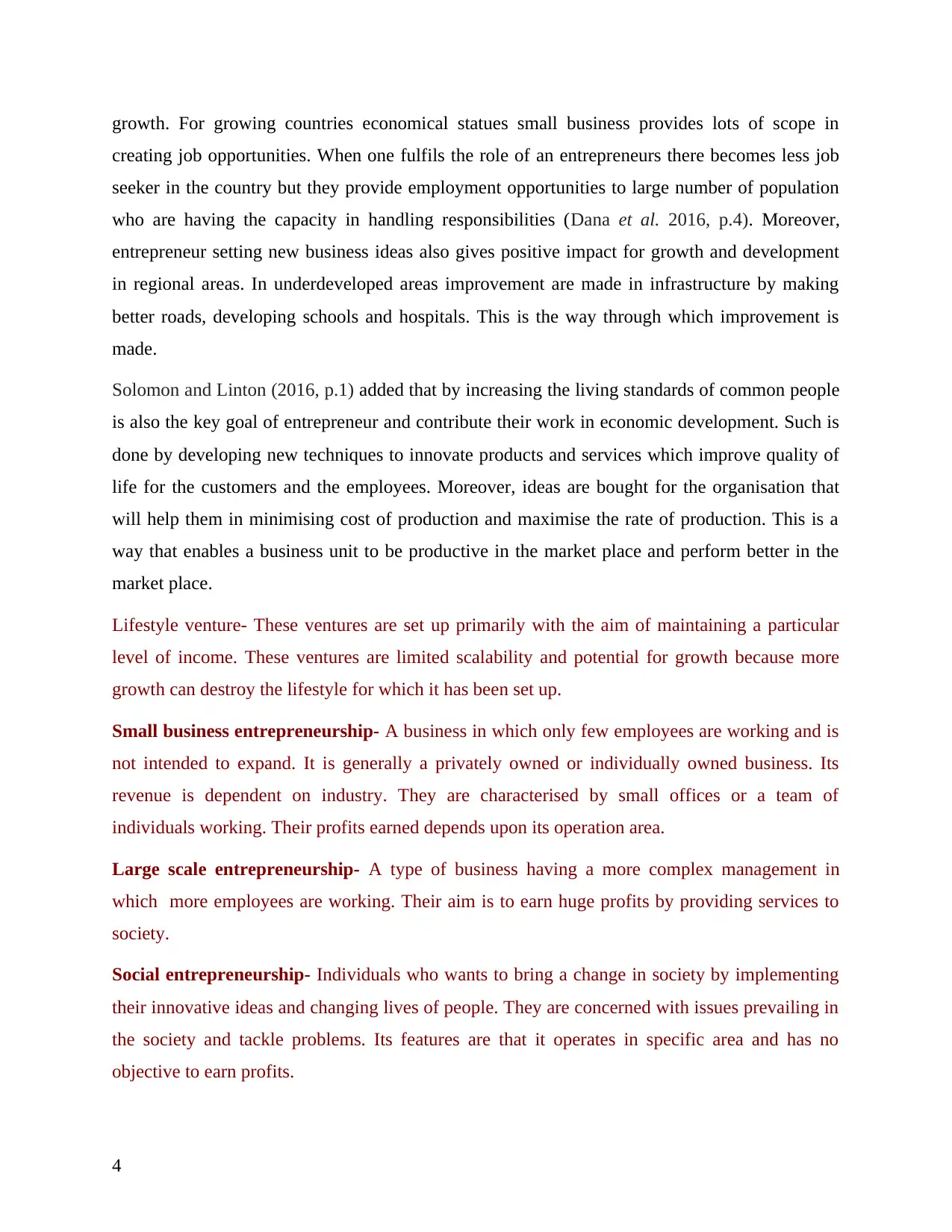
growth. For growing countries economical statues small business provides lots of scope in
creating job opportunities. When one fulfils the role of an entrepreneurs there becomes less job
seeker in the country but they provide employment opportunities to large number of population
who are having the capacity in handling responsibilities (Dana et al. 2016, p.4). Moreover,
entrepreneur setting new business ideas also gives positive impact for growth and development
in regional areas. In underdeveloped areas improvement are made in infrastructure by making
better roads, developing schools and hospitals. This is the way through which improvement is
made.
Solomon and Linton (2016, p.1) added that by increasing the living standards of common people
is also the key goal of entrepreneur and contribute their work in economic development. Such is
done by developing new techniques to innovate products and services which improve quality of
life for the customers and the employees. Moreover, ideas are bought for the organisation that
will help them in minimising cost of production and maximise the rate of production. This is a
way that enables a business unit to be productive in the market place and perform better in the
market place.
Lifestyle venture- These ventures are set up primarily with the aim of maintaining a particular
level of income. These ventures are limited scalability and potential for growth because more
growth can destroy the lifestyle for which it has been set up.
Small business entrepreneurship- A business in which only few employees are working and is
not intended to expand. It is generally a privately owned or individually owned business. Its
revenue is dependent on industry. They are characterised by small offices or a team of
individuals working. Their profits earned depends upon its operation area.
Large scale entrepreneurship- A type of business having a more complex management in
which more employees are working. Their aim is to earn huge profits by providing services to
society.
Social entrepreneurship- Individuals who wants to bring a change in society by implementing
their innovative ideas and changing lives of people. They are concerned with issues prevailing in
the society and tackle problems. Its features are that it operates in specific area and has no
objective to earn profits.
4
creating job opportunities. When one fulfils the role of an entrepreneurs there becomes less job
seeker in the country but they provide employment opportunities to large number of population
who are having the capacity in handling responsibilities (Dana et al. 2016, p.4). Moreover,
entrepreneur setting new business ideas also gives positive impact for growth and development
in regional areas. In underdeveloped areas improvement are made in infrastructure by making
better roads, developing schools and hospitals. This is the way through which improvement is
made.
Solomon and Linton (2016, p.1) added that by increasing the living standards of common people
is also the key goal of entrepreneur and contribute their work in economic development. Such is
done by developing new techniques to innovate products and services which improve quality of
life for the customers and the employees. Moreover, ideas are bought for the organisation that
will help them in minimising cost of production and maximise the rate of production. This is a
way that enables a business unit to be productive in the market place and perform better in the
market place.
Lifestyle venture- These ventures are set up primarily with the aim of maintaining a particular
level of income. These ventures are limited scalability and potential for growth because more
growth can destroy the lifestyle for which it has been set up.
Small business entrepreneurship- A business in which only few employees are working and is
not intended to expand. It is generally a privately owned or individually owned business. Its
revenue is dependent on industry. They are characterised by small offices or a team of
individuals working. Their profits earned depends upon its operation area.
Large scale entrepreneurship- A type of business having a more complex management in
which more employees are working. Their aim is to earn huge profits by providing services to
society.
Social entrepreneurship- Individuals who wants to bring a change in society by implementing
their innovative ideas and changing lives of people. They are concerned with issues prevailing in
the society and tackle problems. Its features are that it operates in specific area and has no
objective to earn profits.
4
Secure Best Marks with AI Grader
Need help grading? Try our AI Grader for instant feedback on your assignments.
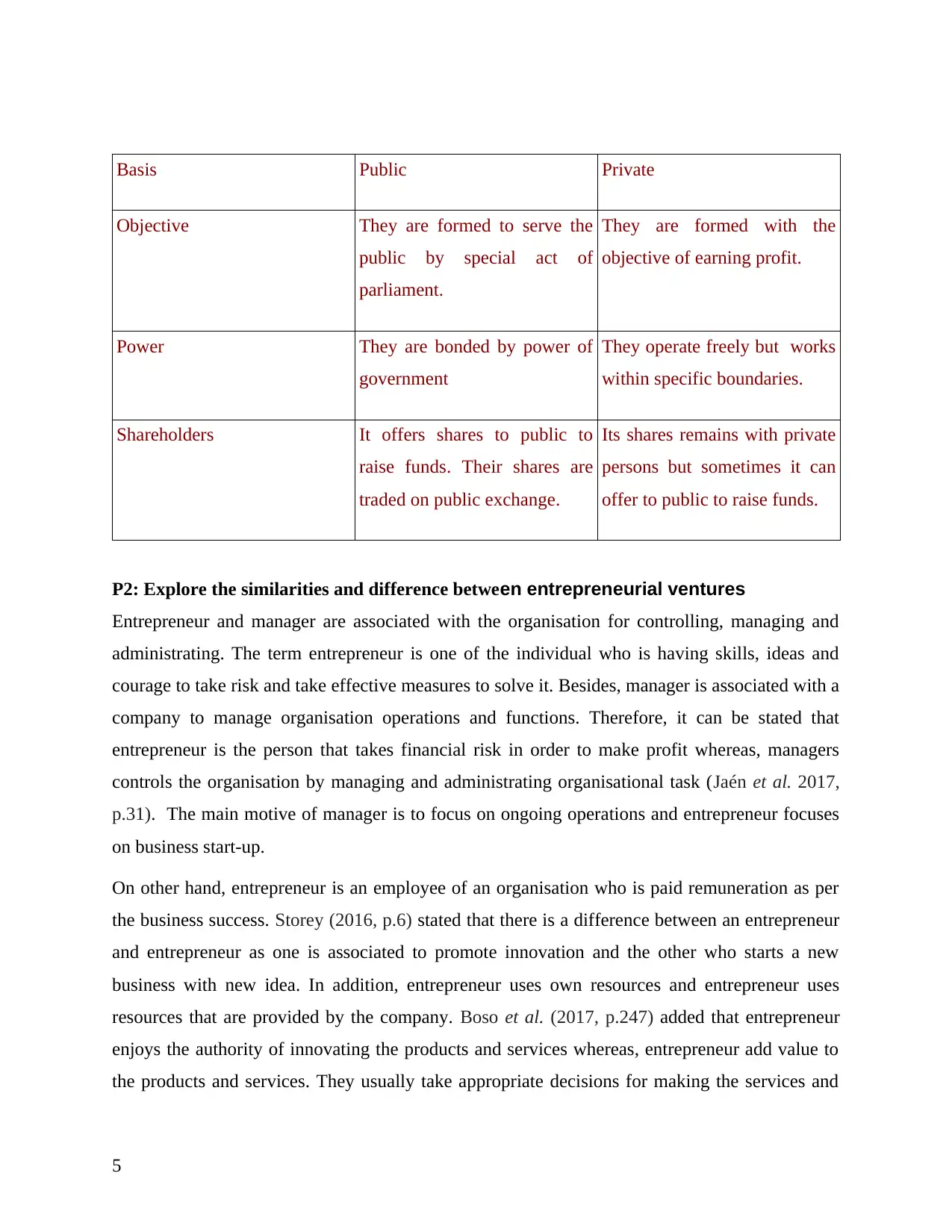
Basis Public Private
Objective They are formed to serve the
public by special act of
parliament.
They are formed with the
objective of earning profit.
Power They are bonded by power of
government
They operate freely but works
within specific boundaries.
Shareholders It offers shares to public to
raise funds. Their shares are
traded on public exchange.
Its shares remains with private
persons but sometimes it can
offer to public to raise funds.
P2: Explore the similarities and difference between entrepreneurial ventures
Entrepreneur and manager are associated with the organisation for controlling, managing and
administrating. The term entrepreneur is one of the individual who is having skills, ideas and
courage to take risk and take effective measures to solve it. Besides, manager is associated with a
company to manage organisation operations and functions. Therefore, it can be stated that
entrepreneur is the person that takes financial risk in order to make profit whereas, managers
controls the organisation by managing and administrating organisational task (Jaén et al. 2017,
p.31). The main motive of manager is to focus on ongoing operations and entrepreneur focuses
on business start-up.
On other hand, entrepreneur is an employee of an organisation who is paid remuneration as per
the business success. Storey (2016, p.6) stated that there is a difference between an entrepreneur
and entrepreneur as one is associated to promote innovation and the other who starts a new
business with new idea. In addition, entrepreneur uses own resources and entrepreneur uses
resources that are provided by the company. Boso et al. (2017, p.247) added that entrepreneur
enjoys the authority of innovating the products and services whereas, entrepreneur add value to
the products and services. They usually take appropriate decisions for making the services and
5
Objective They are formed to serve the
public by special act of
parliament.
They are formed with the
objective of earning profit.
Power They are bonded by power of
government
They operate freely but works
within specific boundaries.
Shareholders It offers shares to public to
raise funds. Their shares are
traded on public exchange.
Its shares remains with private
persons but sometimes it can
offer to public to raise funds.
P2: Explore the similarities and difference between entrepreneurial ventures
Entrepreneur and manager are associated with the organisation for controlling, managing and
administrating. The term entrepreneur is one of the individual who is having skills, ideas and
courage to take risk and take effective measures to solve it. Besides, manager is associated with a
company to manage organisation operations and functions. Therefore, it can be stated that
entrepreneur is the person that takes financial risk in order to make profit whereas, managers
controls the organisation by managing and administrating organisational task (Jaén et al. 2017,
p.31). The main motive of manager is to focus on ongoing operations and entrepreneur focuses
on business start-up.
On other hand, entrepreneur is an employee of an organisation who is paid remuneration as per
the business success. Storey (2016, p.6) stated that there is a difference between an entrepreneur
and entrepreneur as one is associated to promote innovation and the other who starts a new
business with new idea. In addition, entrepreneur uses own resources and entrepreneur uses
resources that are provided by the company. Boso et al. (2017, p.247) added that entrepreneur
enjoys the authority of innovating the products and services whereas, entrepreneur add value to
the products and services. They usually take appropriate decisions for making the services and
5
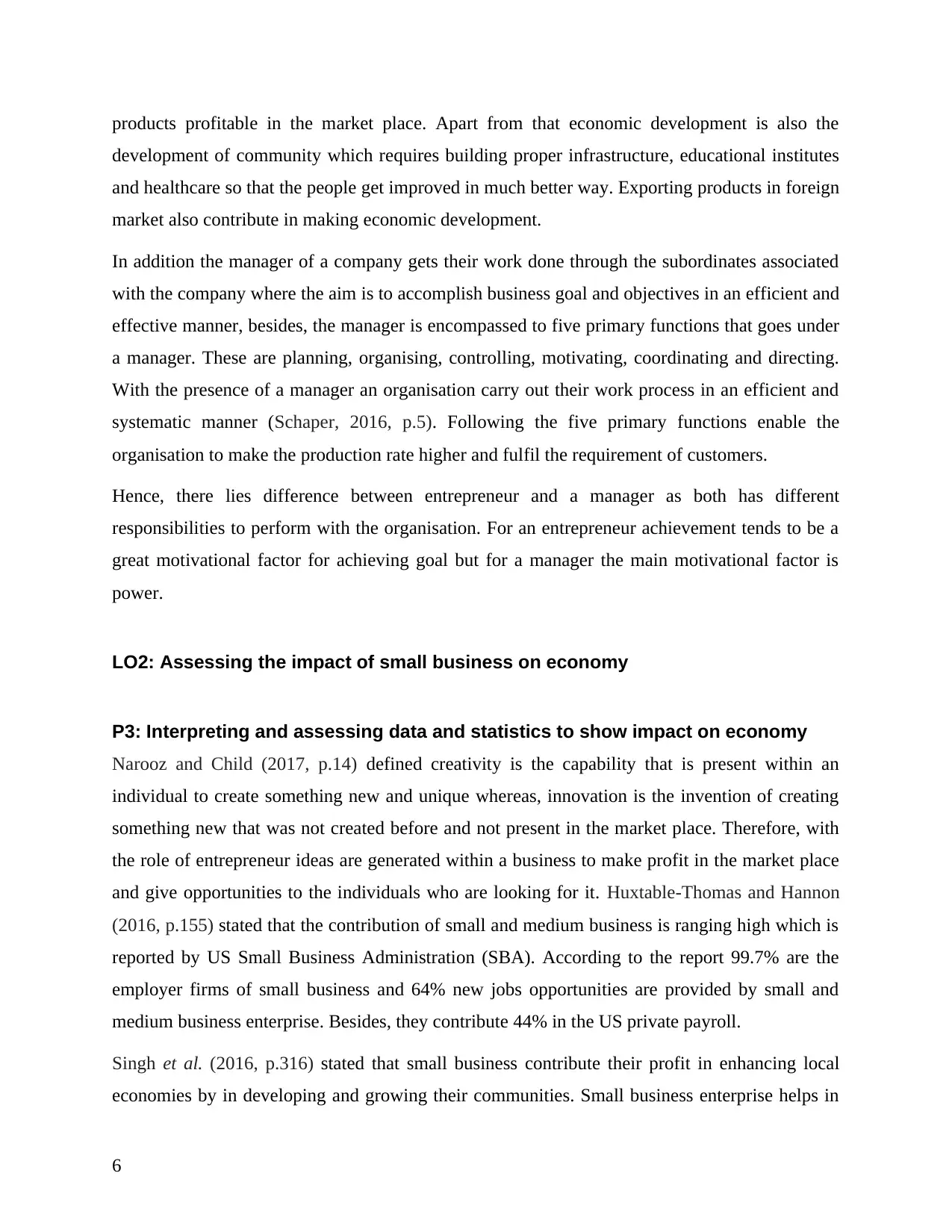
products profitable in the market place. Apart from that economic development is also the
development of community which requires building proper infrastructure, educational institutes
and healthcare so that the people get improved in much better way. Exporting products in foreign
market also contribute in making economic development.
In addition the manager of a company gets their work done through the subordinates associated
with the company where the aim is to accomplish business goal and objectives in an efficient and
effective manner, besides, the manager is encompassed to five primary functions that goes under
a manager. These are planning, organising, controlling, motivating, coordinating and directing.
With the presence of a manager an organisation carry out their work process in an efficient and
systematic manner (Schaper, 2016, p.5). Following the five primary functions enable the
organisation to make the production rate higher and fulfil the requirement of customers.
Hence, there lies difference between entrepreneur and a manager as both has different
responsibilities to perform with the organisation. For an entrepreneur achievement tends to be a
great motivational factor for achieving goal but for a manager the main motivational factor is
power.
LO2: Assessing the impact of small business on economy
P3: Interpreting and assessing data and statistics to show impact on economy
Narooz and Child (2017, p.14) defined creativity is the capability that is present within an
individual to create something new and unique whereas, innovation is the invention of creating
something new that was not created before and not present in the market place. Therefore, with
the role of entrepreneur ideas are generated within a business to make profit in the market place
and give opportunities to the individuals who are looking for it. Huxtable-Thomas and Hannon
(2016, p.155) stated that the contribution of small and medium business is ranging high which is
reported by US Small Business Administration (SBA). According to the report 99.7% are the
employer firms of small business and 64% new jobs opportunities are provided by small and
medium business enterprise. Besides, they contribute 44% in the US private payroll.
Singh et al. (2016, p.316) stated that small business contribute their profit in enhancing local
economies by in developing and growing their communities. Small business enterprise helps in
6
development of community which requires building proper infrastructure, educational institutes
and healthcare so that the people get improved in much better way. Exporting products in foreign
market also contribute in making economic development.
In addition the manager of a company gets their work done through the subordinates associated
with the company where the aim is to accomplish business goal and objectives in an efficient and
effective manner, besides, the manager is encompassed to five primary functions that goes under
a manager. These are planning, organising, controlling, motivating, coordinating and directing.
With the presence of a manager an organisation carry out their work process in an efficient and
systematic manner (Schaper, 2016, p.5). Following the five primary functions enable the
organisation to make the production rate higher and fulfil the requirement of customers.
Hence, there lies difference between entrepreneur and a manager as both has different
responsibilities to perform with the organisation. For an entrepreneur achievement tends to be a
great motivational factor for achieving goal but for a manager the main motivational factor is
power.
LO2: Assessing the impact of small business on economy
P3: Interpreting and assessing data and statistics to show impact on economy
Narooz and Child (2017, p.14) defined creativity is the capability that is present within an
individual to create something new and unique whereas, innovation is the invention of creating
something new that was not created before and not present in the market place. Therefore, with
the role of entrepreneur ideas are generated within a business to make profit in the market place
and give opportunities to the individuals who are looking for it. Huxtable-Thomas and Hannon
(2016, p.155) stated that the contribution of small and medium business is ranging high which is
reported by US Small Business Administration (SBA). According to the report 99.7% are the
employer firms of small business and 64% new jobs opportunities are provided by small and
medium business enterprise. Besides, they contribute 44% in the US private payroll.
Singh et al. (2016, p.316) stated that small business contribute their profit in enhancing local
economies by in developing and growing their communities. Small business enterprise helps in
6
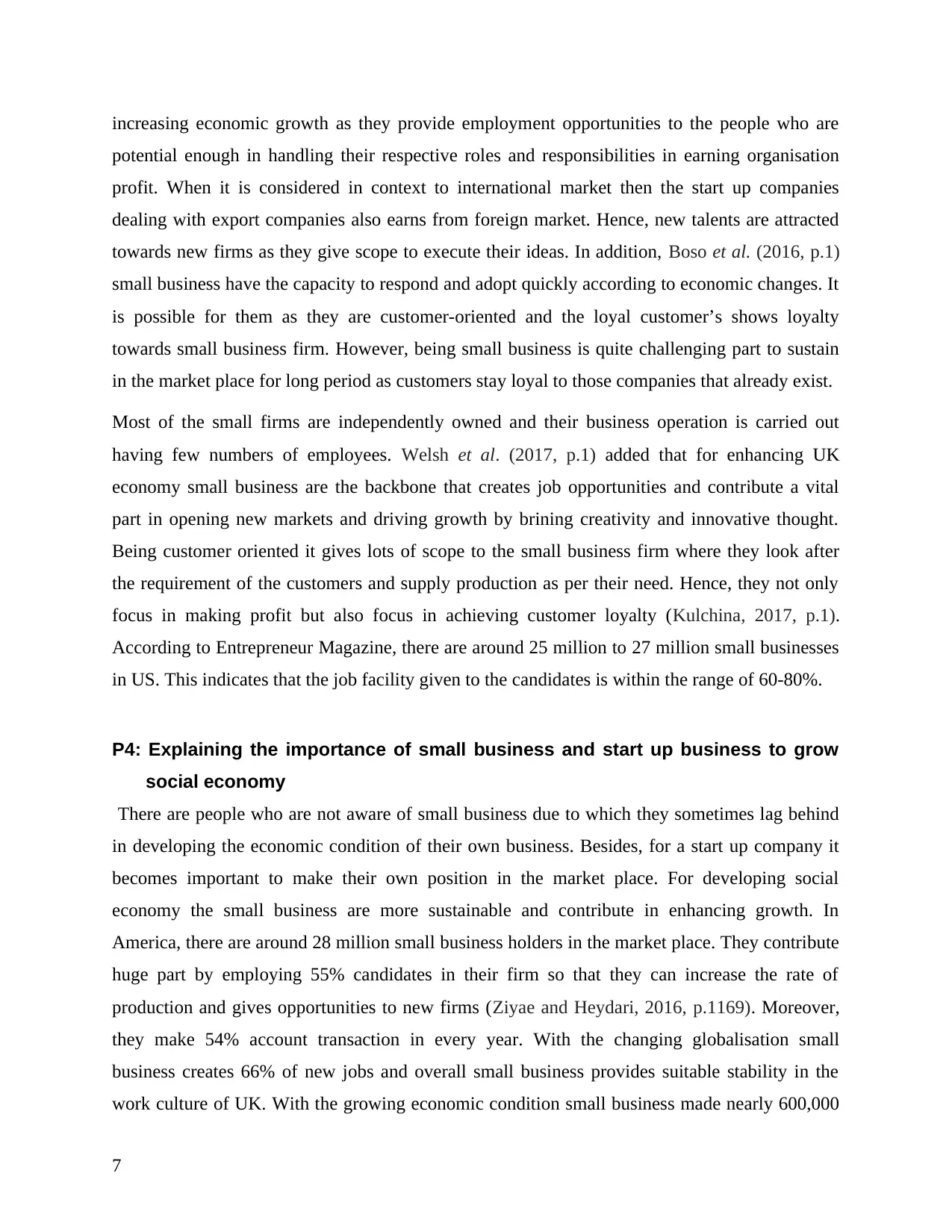
increasing economic growth as they provide employment opportunities to the people who are
potential enough in handling their respective roles and responsibilities in earning organisation
profit. When it is considered in context to international market then the start up companies
dealing with export companies also earns from foreign market. Hence, new talents are attracted
towards new firms as they give scope to execute their ideas. In addition, Boso et al. (2016, p.1)
small business have the capacity to respond and adopt quickly according to economic changes. It
is possible for them as they are customer-oriented and the loyal customer’s shows loyalty
towards small business firm. However, being small business is quite challenging part to sustain
in the market place for long period as customers stay loyal to those companies that already exist.
Most of the small firms are independently owned and their business operation is carried out
having few numbers of employees. Welsh et al. (2017, p.1) added that for enhancing UK
economy small business are the backbone that creates job opportunities and contribute a vital
part in opening new markets and driving growth by brining creativity and innovative thought.
Being customer oriented it gives lots of scope to the small business firm where they look after
the requirement of the customers and supply production as per their need. Hence, they not only
focus in making profit but also focus in achieving customer loyalty (Kulchina, 2017, p.1).
According to Entrepreneur Magazine, there are around 25 million to 27 million small businesses
in US. This indicates that the job facility given to the candidates is within the range of 60-80%.
P4: Explaining the importance of small business and start up business to grow
social economy
There are people who are not aware of small business due to which they sometimes lag behind
in developing the economic condition of their own business. Besides, for a start up company it
becomes important to make their own position in the market place. For developing social
economy the small business are more sustainable and contribute in enhancing growth. In
America, there are around 28 million small business holders in the market place. They contribute
huge part by employing 55% candidates in their firm so that they can increase the rate of
production and gives opportunities to new firms (Ziyae and Heydari, 2016, p.1169). Moreover,
they make 54% account transaction in every year. With the changing globalisation small
business creates 66% of new jobs and overall small business provides suitable stability in the
work culture of UK. With the growing economic condition small business made nearly 600,000
7
potential enough in handling their respective roles and responsibilities in earning organisation
profit. When it is considered in context to international market then the start up companies
dealing with export companies also earns from foreign market. Hence, new talents are attracted
towards new firms as they give scope to execute their ideas. In addition, Boso et al. (2016, p.1)
small business have the capacity to respond and adopt quickly according to economic changes. It
is possible for them as they are customer-oriented and the loyal customer’s shows loyalty
towards small business firm. However, being small business is quite challenging part to sustain
in the market place for long period as customers stay loyal to those companies that already exist.
Most of the small firms are independently owned and their business operation is carried out
having few numbers of employees. Welsh et al. (2017, p.1) added that for enhancing UK
economy small business are the backbone that creates job opportunities and contribute a vital
part in opening new markets and driving growth by brining creativity and innovative thought.
Being customer oriented it gives lots of scope to the small business firm where they look after
the requirement of the customers and supply production as per their need. Hence, they not only
focus in making profit but also focus in achieving customer loyalty (Kulchina, 2017, p.1).
According to Entrepreneur Magazine, there are around 25 million to 27 million small businesses
in US. This indicates that the job facility given to the candidates is within the range of 60-80%.
P4: Explaining the importance of small business and start up business to grow
social economy
There are people who are not aware of small business due to which they sometimes lag behind
in developing the economic condition of their own business. Besides, for a start up company it
becomes important to make their own position in the market place. For developing social
economy the small business are more sustainable and contribute in enhancing growth. In
America, there are around 28 million small business holders in the market place. They contribute
huge part by employing 55% candidates in their firm so that they can increase the rate of
production and gives opportunities to new firms (Ziyae and Heydari, 2016, p.1169). Moreover,
they make 54% account transaction in every year. With the changing globalisation small
business creates 66% of new jobs and overall small business provides suitable stability in the
work culture of UK. With the growing economic condition small business made nearly 600,000
7
Paraphrase This Document
Need a fresh take? Get an instant paraphrase of this document with our AI Paraphraser
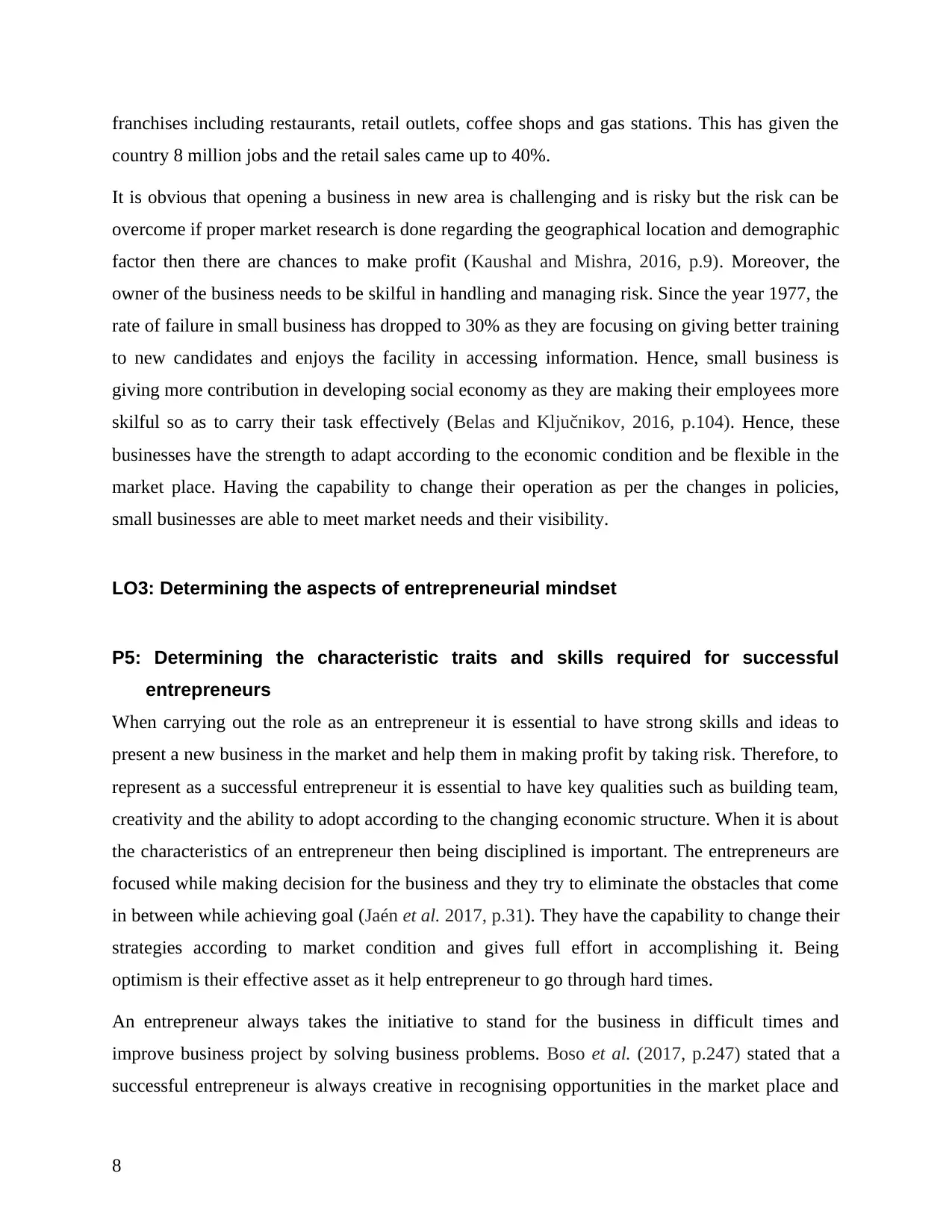
franchises including restaurants, retail outlets, coffee shops and gas stations. This has given the
country 8 million jobs and the retail sales came up to 40%.
It is obvious that opening a business in new area is challenging and is risky but the risk can be
overcome if proper market research is done regarding the geographical location and demographic
factor then there are chances to make profit (Kaushal and Mishra, 2016, p.9). Moreover, the
owner of the business needs to be skilful in handling and managing risk. Since the year 1977, the
rate of failure in small business has dropped to 30% as they are focusing on giving better training
to new candidates and enjoys the facility in accessing information. Hence, small business is
giving more contribution in developing social economy as they are making their employees more
skilful so as to carry their task effectively (Belas and Ključnikov, 2016, p.104). Hence, these
businesses have the strength to adapt according to the economic condition and be flexible in the
market place. Having the capability to change their operation as per the changes in policies,
small businesses are able to meet market needs and their visibility.
LO3: Determining the aspects of entrepreneurial mindset
P5: Determining the characteristic traits and skills required for successful
entrepreneurs
When carrying out the role as an entrepreneur it is essential to have strong skills and ideas to
present a new business in the market and help them in making profit by taking risk. Therefore, to
represent as a successful entrepreneur it is essential to have key qualities such as building team,
creativity and the ability to adopt according to the changing economic structure. When it is about
the characteristics of an entrepreneur then being disciplined is important. The entrepreneurs are
focused while making decision for the business and they try to eliminate the obstacles that come
in between while achieving goal (Jaén et al. 2017, p.31). They have the capability to change their
strategies according to market condition and gives full effort in accomplishing it. Being
optimism is their effective asset as it help entrepreneur to go through hard times.
An entrepreneur always takes the initiative to stand for the business in difficult times and
improve business project by solving business problems. Boso et al. (2017, p.247) stated that a
successful entrepreneur is always creative in recognising opportunities in the market place and
8
country 8 million jobs and the retail sales came up to 40%.
It is obvious that opening a business in new area is challenging and is risky but the risk can be
overcome if proper market research is done regarding the geographical location and demographic
factor then there are chances to make profit (Kaushal and Mishra, 2016, p.9). Moreover, the
owner of the business needs to be skilful in handling and managing risk. Since the year 1977, the
rate of failure in small business has dropped to 30% as they are focusing on giving better training
to new candidates and enjoys the facility in accessing information. Hence, small business is
giving more contribution in developing social economy as they are making their employees more
skilful so as to carry their task effectively (Belas and Ključnikov, 2016, p.104). Hence, these
businesses have the strength to adapt according to the economic condition and be flexible in the
market place. Having the capability to change their operation as per the changes in policies,
small businesses are able to meet market needs and their visibility.
LO3: Determining the aspects of entrepreneurial mindset
P5: Determining the characteristic traits and skills required for successful
entrepreneurs
When carrying out the role as an entrepreneur it is essential to have strong skills and ideas to
present a new business in the market and help them in making profit by taking risk. Therefore, to
represent as a successful entrepreneur it is essential to have key qualities such as building team,
creativity and the ability to adopt according to the changing economic structure. When it is about
the characteristics of an entrepreneur then being disciplined is important. The entrepreneurs are
focused while making decision for the business and they try to eliminate the obstacles that come
in between while achieving goal (Jaén et al. 2017, p.31). They have the capability to change their
strategies according to market condition and gives full effort in accomplishing it. Being
optimism is their effective asset as it help entrepreneur to go through hard times.
An entrepreneur always takes the initiative to stand for the business in difficult times and
improve business project by solving business problems. Boso et al. (2017, p.247) stated that a
successful entrepreneur is always creative in recognising opportunities in the market place and
8
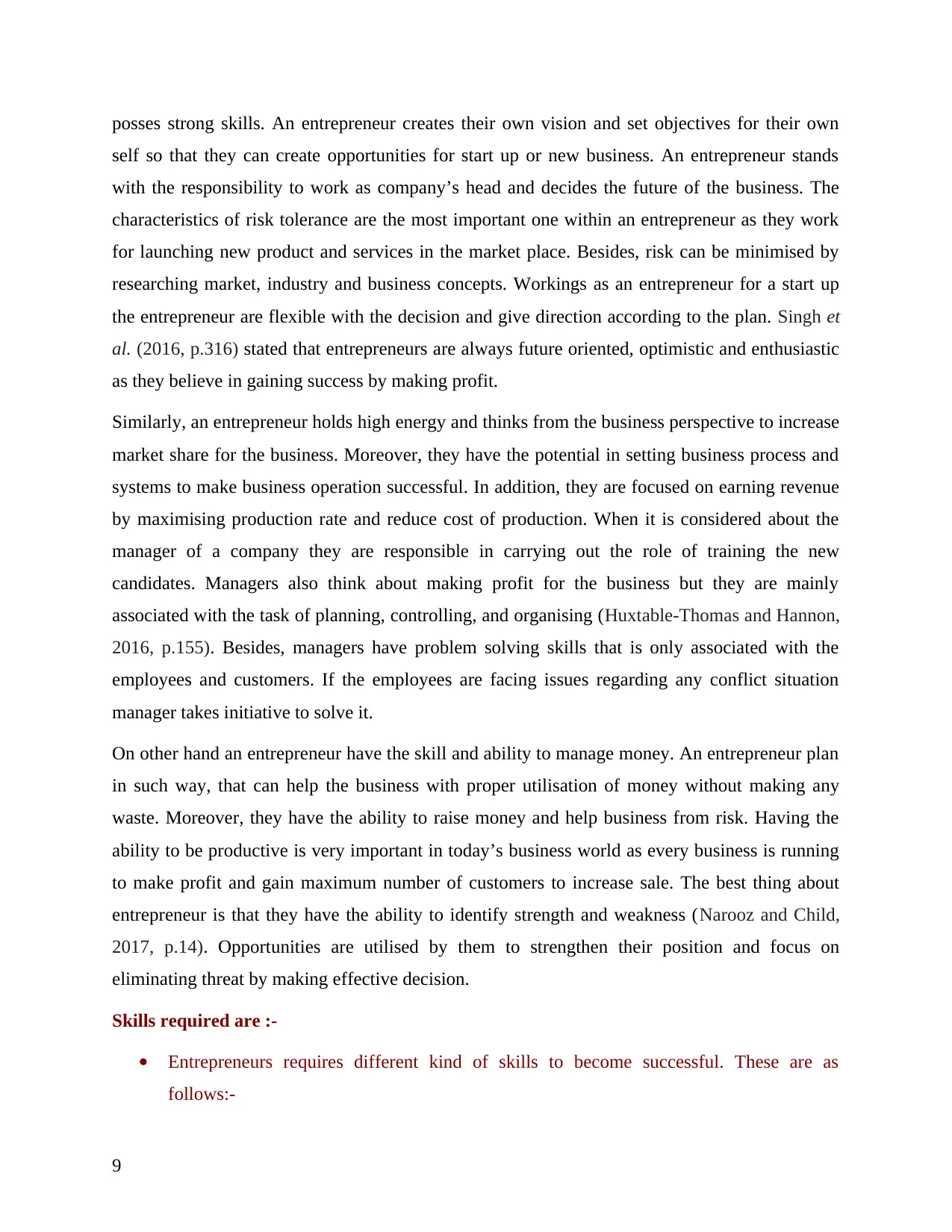
posses strong skills. An entrepreneur creates their own vision and set objectives for their own
self so that they can create opportunities for start up or new business. An entrepreneur stands
with the responsibility to work as company’s head and decides the future of the business. The
characteristics of risk tolerance are the most important one within an entrepreneur as they work
for launching new product and services in the market place. Besides, risk can be minimised by
researching market, industry and business concepts. Workings as an entrepreneur for a start up
the entrepreneur are flexible with the decision and give direction according to the plan. Singh et
al. (2016, p.316) stated that entrepreneurs are always future oriented, optimistic and enthusiastic
as they believe in gaining success by making profit.
Similarly, an entrepreneur holds high energy and thinks from the business perspective to increase
market share for the business. Moreover, they have the potential in setting business process and
systems to make business operation successful. In addition, they are focused on earning revenue
by maximising production rate and reduce cost of production. When it is considered about the
manager of a company they are responsible in carrying out the role of training the new
candidates. Managers also think about making profit for the business but they are mainly
associated with the task of planning, controlling, and organising (Huxtable-Thomas and Hannon,
2016, p.155). Besides, managers have problem solving skills that is only associated with the
employees and customers. If the employees are facing issues regarding any conflict situation
manager takes initiative to solve it.
On other hand an entrepreneur have the skill and ability to manage money. An entrepreneur plan
in such way, that can help the business with proper utilisation of money without making any
waste. Moreover, they have the ability to raise money and help business from risk. Having the
ability to be productive is very important in today’s business world as every business is running
to make profit and gain maximum number of customers to increase sale. The best thing about
entrepreneur is that they have the ability to identify strength and weakness (Narooz and Child,
2017, p.14). Opportunities are utilised by them to strengthen their position and focus on
eliminating threat by making effective decision.
Skills required are :-
Entrepreneurs requires different kind of skills to become successful. These are as
follows:-
9
self so that they can create opportunities for start up or new business. An entrepreneur stands
with the responsibility to work as company’s head and decides the future of the business. The
characteristics of risk tolerance are the most important one within an entrepreneur as they work
for launching new product and services in the market place. Besides, risk can be minimised by
researching market, industry and business concepts. Workings as an entrepreneur for a start up
the entrepreneur are flexible with the decision and give direction according to the plan. Singh et
al. (2016, p.316) stated that entrepreneurs are always future oriented, optimistic and enthusiastic
as they believe in gaining success by making profit.
Similarly, an entrepreneur holds high energy and thinks from the business perspective to increase
market share for the business. Moreover, they have the potential in setting business process and
systems to make business operation successful. In addition, they are focused on earning revenue
by maximising production rate and reduce cost of production. When it is considered about the
manager of a company they are responsible in carrying out the role of training the new
candidates. Managers also think about making profit for the business but they are mainly
associated with the task of planning, controlling, and organising (Huxtable-Thomas and Hannon,
2016, p.155). Besides, managers have problem solving skills that is only associated with the
employees and customers. If the employees are facing issues regarding any conflict situation
manager takes initiative to solve it.
On other hand an entrepreneur have the skill and ability to manage money. An entrepreneur plan
in such way, that can help the business with proper utilisation of money without making any
waste. Moreover, they have the ability to raise money and help business from risk. Having the
ability to be productive is very important in today’s business world as every business is running
to make profit and gain maximum number of customers to increase sale. The best thing about
entrepreneur is that they have the ability to identify strength and weakness (Narooz and Child,
2017, p.14). Opportunities are utilised by them to strengthen their position and focus on
eliminating threat by making effective decision.
Skills required are :-
Entrepreneurs requires different kind of skills to become successful. These are as
follows:-
9
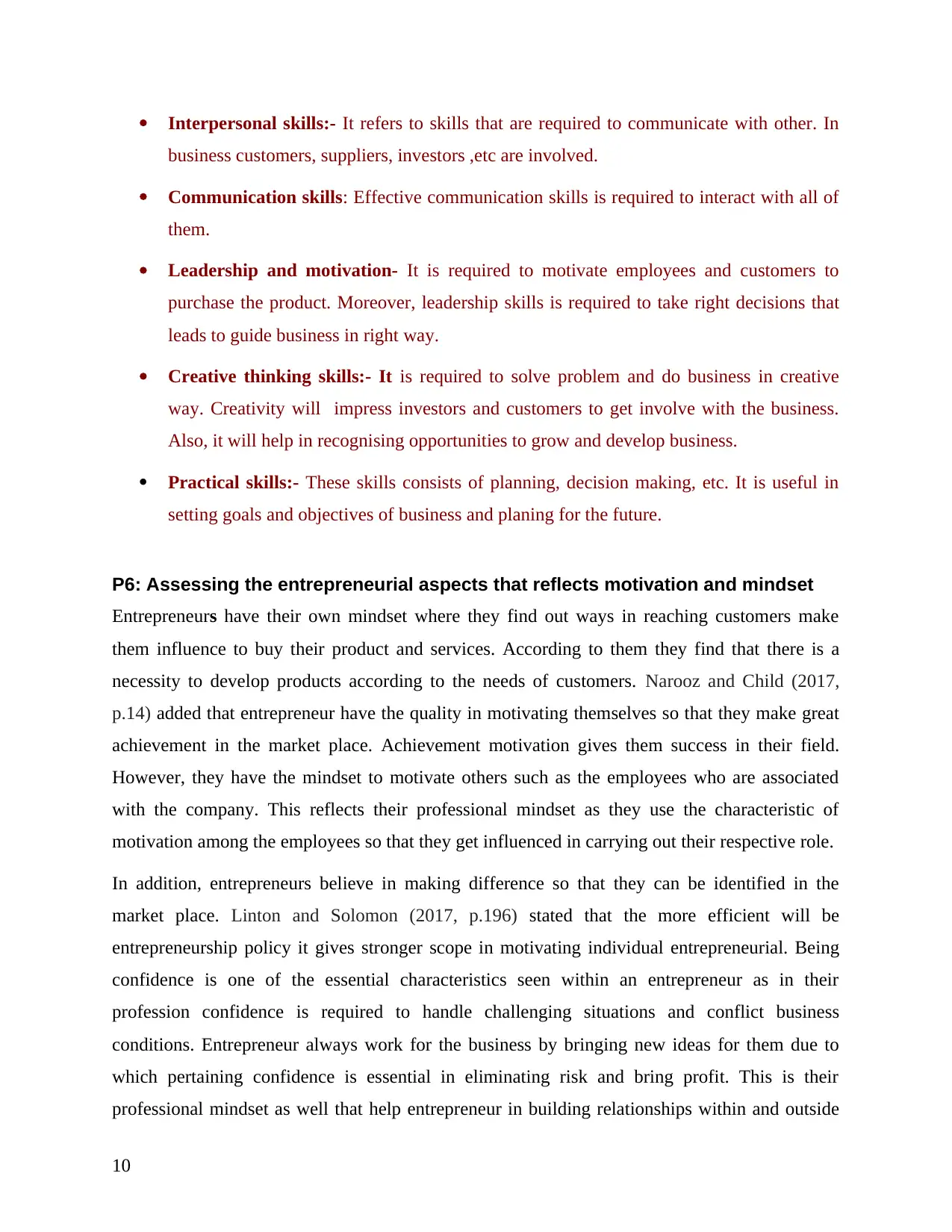
Interpersonal skills:- It refers to skills that are required to communicate with other. In
business customers, suppliers, investors ,etc are involved.
Communication skills: Effective communication skills is required to interact with all of
them.
Leadership and motivation- It is required to motivate employees and customers to
purchase the product. Moreover, leadership skills is required to take right decisions that
leads to guide business in right way.
Creative thinking skills:- It is required to solve problem and do business in creative
way. Creativity will impress investors and customers to get involve with the business.
Also, it will help in recognising opportunities to grow and develop business.
Practical skills:- These skills consists of planning, decision making, etc. It is useful in
setting goals and objectives of business and planing for the future.
P6: Assessing the entrepreneurial aspects that reflects motivation and mindset
Entrepreneurs have their own mindset where they find out ways in reaching customers make
them influence to buy their product and services. According to them they find that there is a
necessity to develop products according to the needs of customers. Narooz and Child (2017,
p.14) added that entrepreneur have the quality in motivating themselves so that they make great
achievement in the market place. Achievement motivation gives them success in their field.
However, they have the mindset to motivate others such as the employees who are associated
with the company. This reflects their professional mindset as they use the characteristic of
motivation among the employees so that they get influenced in carrying out their respective role.
In addition, entrepreneurs believe in making difference so that they can be identified in the
market place. Linton and Solomon (2017, p.196) stated that the more efficient will be
entrepreneurship policy it gives stronger scope in motivating individual entrepreneurial. Being
confidence is one of the essential characteristics seen within an entrepreneur as in their
profession confidence is required to handle challenging situations and conflict business
conditions. Entrepreneur always work for the business by bringing new ideas for them due to
which pertaining confidence is essential in eliminating risk and bring profit. This is their
professional mindset as well that help entrepreneur in building relationships within and outside
10
business customers, suppliers, investors ,etc are involved.
Communication skills: Effective communication skills is required to interact with all of
them.
Leadership and motivation- It is required to motivate employees and customers to
purchase the product. Moreover, leadership skills is required to take right decisions that
leads to guide business in right way.
Creative thinking skills:- It is required to solve problem and do business in creative
way. Creativity will impress investors and customers to get involve with the business.
Also, it will help in recognising opportunities to grow and develop business.
Practical skills:- These skills consists of planning, decision making, etc. It is useful in
setting goals and objectives of business and planing for the future.
P6: Assessing the entrepreneurial aspects that reflects motivation and mindset
Entrepreneurs have their own mindset where they find out ways in reaching customers make
them influence to buy their product and services. According to them they find that there is a
necessity to develop products according to the needs of customers. Narooz and Child (2017,
p.14) added that entrepreneur have the quality in motivating themselves so that they make great
achievement in the market place. Achievement motivation gives them success in their field.
However, they have the mindset to motivate others such as the employees who are associated
with the company. This reflects their professional mindset as they use the characteristic of
motivation among the employees so that they get influenced in carrying out their respective role.
In addition, entrepreneurs believe in making difference so that they can be identified in the
market place. Linton and Solomon (2017, p.196) stated that the more efficient will be
entrepreneurship policy it gives stronger scope in motivating individual entrepreneurial. Being
confidence is one of the essential characteristics seen within an entrepreneur as in their
profession confidence is required to handle challenging situations and conflict business
conditions. Entrepreneur always work for the business by bringing new ideas for them due to
which pertaining confidence is essential in eliminating risk and bring profit. This is their
professional mindset as well that help entrepreneur in building relationships within and outside
10
Secure Best Marks with AI Grader
Need help grading? Try our AI Grader for instant feedback on your assignments.
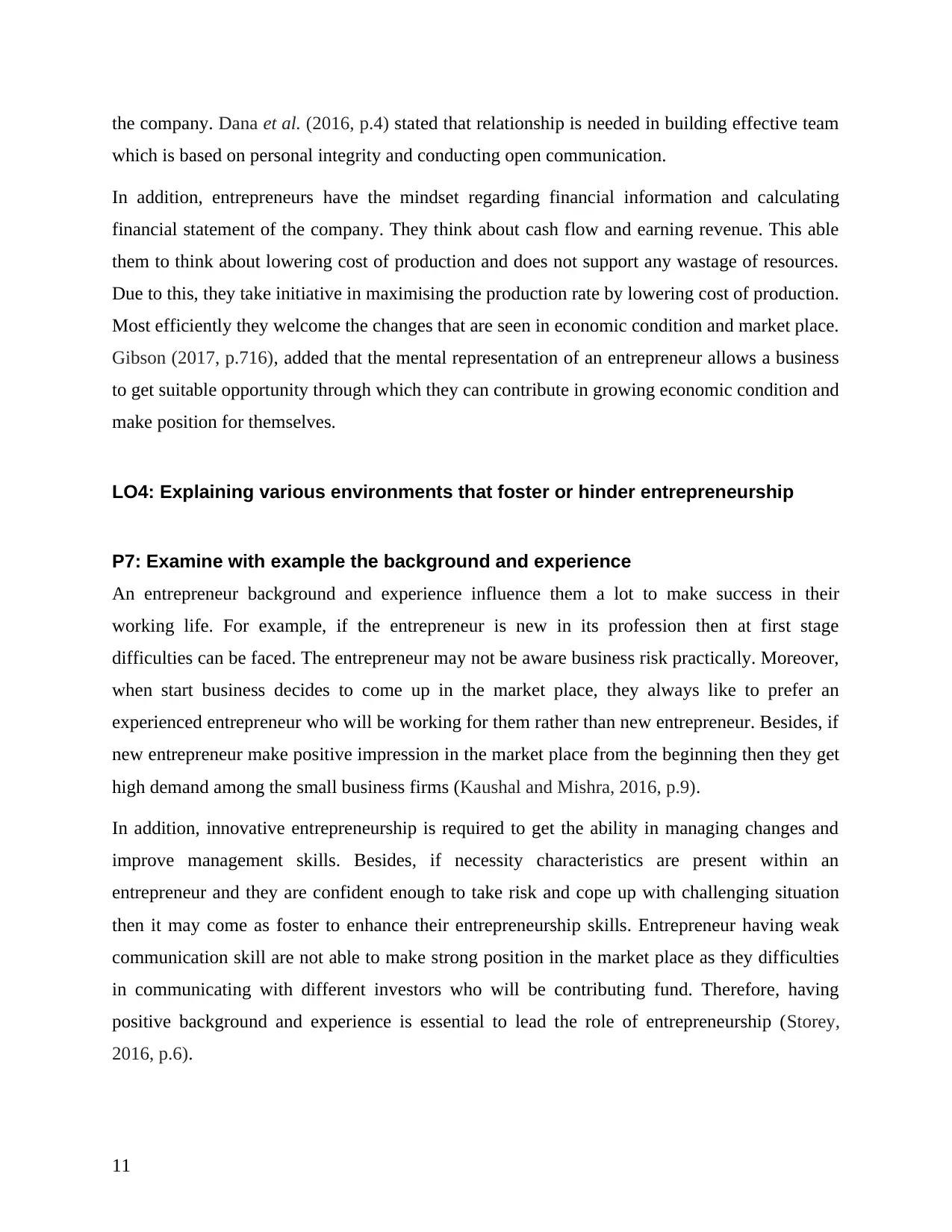
the company. Dana et al. (2016, p.4) stated that relationship is needed in building effective team
which is based on personal integrity and conducting open communication.
In addition, entrepreneurs have the mindset regarding financial information and calculating
financial statement of the company. They think about cash flow and earning revenue. This able
them to think about lowering cost of production and does not support any wastage of resources.
Due to this, they take initiative in maximising the production rate by lowering cost of production.
Most efficiently they welcome the changes that are seen in economic condition and market place.
Gibson (2017, p.716), added that the mental representation of an entrepreneur allows a business
to get suitable opportunity through which they can contribute in growing economic condition and
make position for themselves.
LO4: Explaining various environments that foster or hinder entrepreneurship
P7: Examine with example the background and experience
An entrepreneur background and experience influence them a lot to make success in their
working life. For example, if the entrepreneur is new in its profession then at first stage
difficulties can be faced. The entrepreneur may not be aware business risk practically. Moreover,
when start business decides to come up in the market place, they always like to prefer an
experienced entrepreneur who will be working for them rather than new entrepreneur. Besides, if
new entrepreneur make positive impression in the market place from the beginning then they get
high demand among the small business firms (Kaushal and Mishra, 2016, p.9).
In addition, innovative entrepreneurship is required to get the ability in managing changes and
improve management skills. Besides, if necessity characteristics are present within an
entrepreneur and they are confident enough to take risk and cope up with challenging situation
then it may come as foster to enhance their entrepreneurship skills. Entrepreneur having weak
communication skill are not able to make strong position in the market place as they difficulties
in communicating with different investors who will be contributing fund. Therefore, having
positive background and experience is essential to lead the role of entrepreneurship (Storey,
2016, p.6).
11
which is based on personal integrity and conducting open communication.
In addition, entrepreneurs have the mindset regarding financial information and calculating
financial statement of the company. They think about cash flow and earning revenue. This able
them to think about lowering cost of production and does not support any wastage of resources.
Due to this, they take initiative in maximising the production rate by lowering cost of production.
Most efficiently they welcome the changes that are seen in economic condition and market place.
Gibson (2017, p.716), added that the mental representation of an entrepreneur allows a business
to get suitable opportunity through which they can contribute in growing economic condition and
make position for themselves.
LO4: Explaining various environments that foster or hinder entrepreneurship
P7: Examine with example the background and experience
An entrepreneur background and experience influence them a lot to make success in their
working life. For example, if the entrepreneur is new in its profession then at first stage
difficulties can be faced. The entrepreneur may not be aware business risk practically. Moreover,
when start business decides to come up in the market place, they always like to prefer an
experienced entrepreneur who will be working for them rather than new entrepreneur. Besides, if
new entrepreneur make positive impression in the market place from the beginning then they get
high demand among the small business firms (Kaushal and Mishra, 2016, p.9).
In addition, innovative entrepreneurship is required to get the ability in managing changes and
improve management skills. Besides, if necessity characteristics are present within an
entrepreneur and they are confident enough to take risk and cope up with challenging situation
then it may come as foster to enhance their entrepreneurship skills. Entrepreneur having weak
communication skill are not able to make strong position in the market place as they difficulties
in communicating with different investors who will be contributing fund. Therefore, having
positive background and experience is essential to lead the role of entrepreneurship (Storey,
2016, p.6).
11
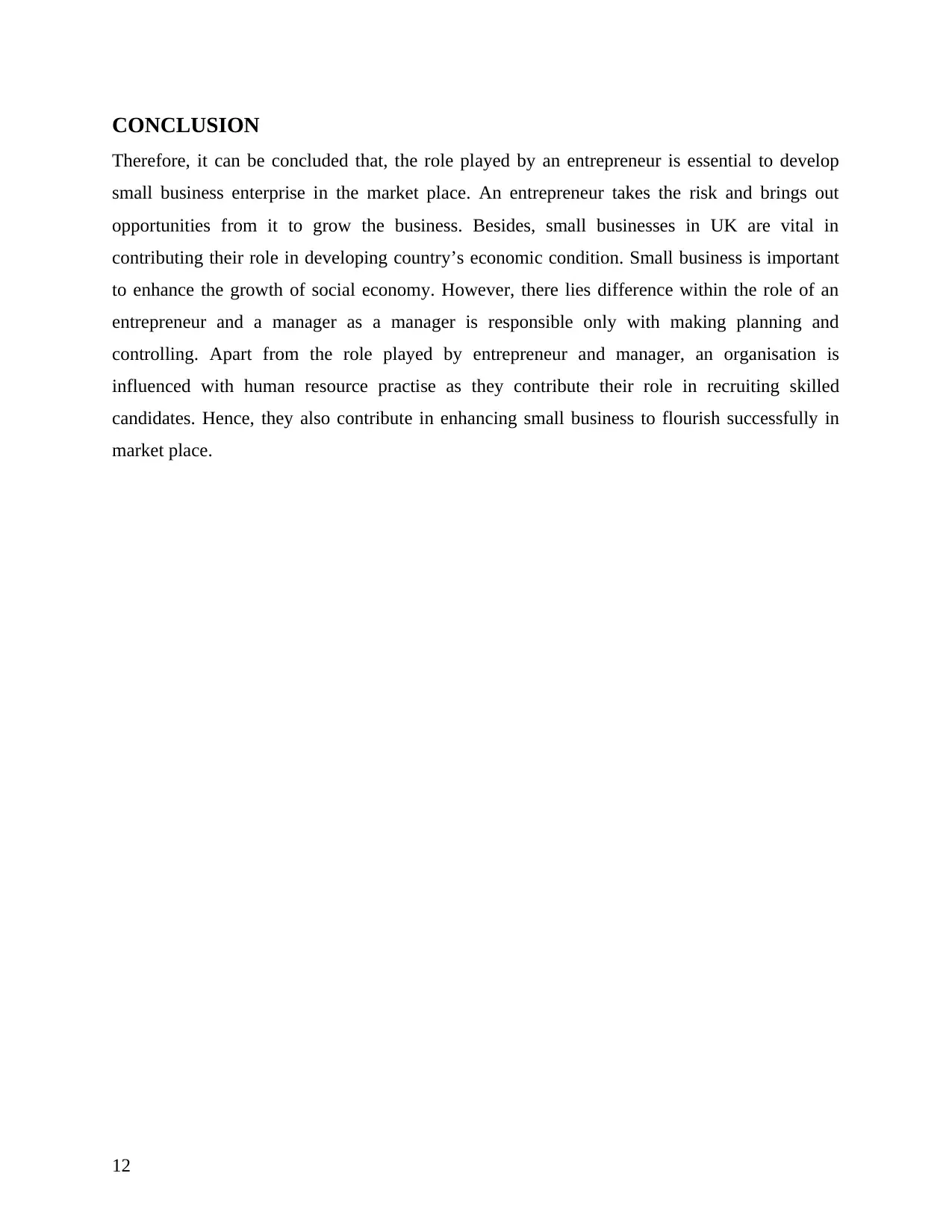
CONCLUSION
Therefore, it can be concluded that, the role played by an entrepreneur is essential to develop
small business enterprise in the market place. An entrepreneur takes the risk and brings out
opportunities from it to grow the business. Besides, small businesses in UK are vital in
contributing their role in developing country’s economic condition. Small business is important
to enhance the growth of social economy. However, there lies difference within the role of an
entrepreneur and a manager as a manager is responsible only with making planning and
controlling. Apart from the role played by entrepreneur and manager, an organisation is
influenced with human resource practise as they contribute their role in recruiting skilled
candidates. Hence, they also contribute in enhancing small business to flourish successfully in
market place.
12
Therefore, it can be concluded that, the role played by an entrepreneur is essential to develop
small business enterprise in the market place. An entrepreneur takes the risk and brings out
opportunities from it to grow the business. Besides, small businesses in UK are vital in
contributing their role in developing country’s economic condition. Small business is important
to enhance the growth of social economy. However, there lies difference within the role of an
entrepreneur and a manager as a manager is responsible only with making planning and
controlling. Apart from the role played by entrepreneur and manager, an organisation is
influenced with human resource practise as they contribute their role in recruiting skilled
candidates. Hence, they also contribute in enhancing small business to flourish successfully in
market place.
12
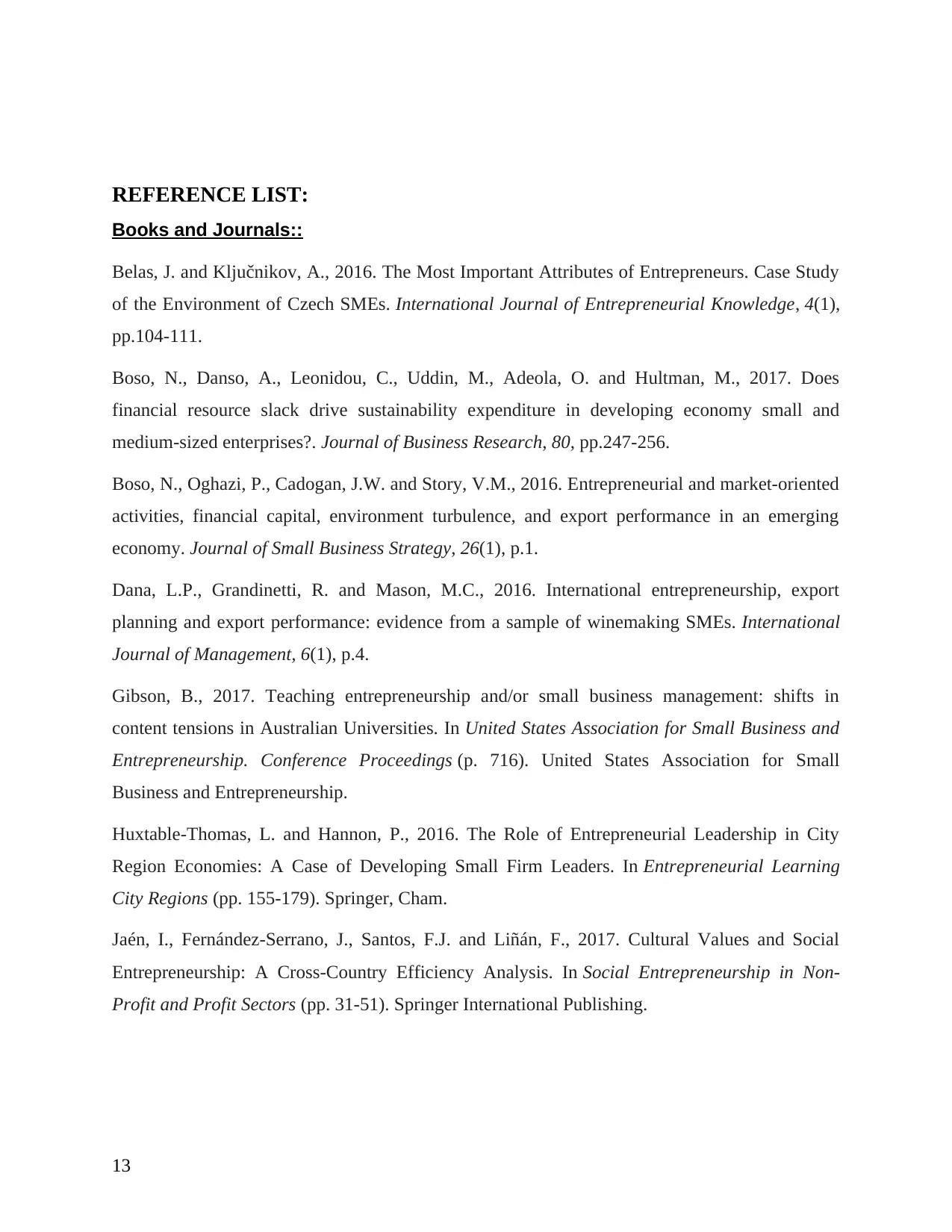
REFERENCE LIST:
Books and Journals::
Belas, J. and Ključnikov, A., 2016. The Most Important Attributes of Entrepreneurs. Case Study
of the Environment of Czech SMEs. International Journal of Entrepreneurial Knowledge, 4(1),
pp.104-111.
Boso, N., Danso, A., Leonidou, C., Uddin, M., Adeola, O. and Hultman, M., 2017. Does
financial resource slack drive sustainability expenditure in developing economy small and
medium-sized enterprises?. Journal of Business Research, 80, pp.247-256.
Boso, N., Oghazi, P., Cadogan, J.W. and Story, V.M., 2016. Entrepreneurial and market-oriented
activities, financial capital, environment turbulence, and export performance in an emerging
economy. Journal of Small Business Strategy, 26(1), p.1.
Dana, L.P., Grandinetti, R. and Mason, M.C., 2016. International entrepreneurship, export
planning and export performance: evidence from a sample of winemaking SMEs. International
Journal of Management, 6(1), p.4.
Gibson, B., 2017. Teaching entrepreneurship and/or small business management: shifts in
content tensions in Australian Universities. In United States Association for Small Business and
Entrepreneurship. Conference Proceedings (p. 716). United States Association for Small
Business and Entrepreneurship.
Huxtable-Thomas, L. and Hannon, P., 2016. The Role of Entrepreneurial Leadership in City
Region Economies: A Case of Developing Small Firm Leaders. In Entrepreneurial Learning
City Regions (pp. 155-179). Springer, Cham.
Jaén, I., Fernández-Serrano, J., Santos, F.J. and Liñán, F., 2017. Cultural Values and Social
Entrepreneurship: A Cross-Country Efficiency Analysis. In Social Entrepreneurship in Non-
Profit and Profit Sectors (pp. 31-51). Springer International Publishing.
13
Books and Journals::
Belas, J. and Ključnikov, A., 2016. The Most Important Attributes of Entrepreneurs. Case Study
of the Environment of Czech SMEs. International Journal of Entrepreneurial Knowledge, 4(1),
pp.104-111.
Boso, N., Danso, A., Leonidou, C., Uddin, M., Adeola, O. and Hultman, M., 2017. Does
financial resource slack drive sustainability expenditure in developing economy small and
medium-sized enterprises?. Journal of Business Research, 80, pp.247-256.
Boso, N., Oghazi, P., Cadogan, J.W. and Story, V.M., 2016. Entrepreneurial and market-oriented
activities, financial capital, environment turbulence, and export performance in an emerging
economy. Journal of Small Business Strategy, 26(1), p.1.
Dana, L.P., Grandinetti, R. and Mason, M.C., 2016. International entrepreneurship, export
planning and export performance: evidence from a sample of winemaking SMEs. International
Journal of Management, 6(1), p.4.
Gibson, B., 2017. Teaching entrepreneurship and/or small business management: shifts in
content tensions in Australian Universities. In United States Association for Small Business and
Entrepreneurship. Conference Proceedings (p. 716). United States Association for Small
Business and Entrepreneurship.
Huxtable-Thomas, L. and Hannon, P., 2016. The Role of Entrepreneurial Leadership in City
Region Economies: A Case of Developing Small Firm Leaders. In Entrepreneurial Learning
City Regions (pp. 155-179). Springer, Cham.
Jaén, I., Fernández-Serrano, J., Santos, F.J. and Liñán, F., 2017. Cultural Values and Social
Entrepreneurship: A Cross-Country Efficiency Analysis. In Social Entrepreneurship in Non-
Profit and Profit Sectors (pp. 31-51). Springer International Publishing.
13
Paraphrase This Document
Need a fresh take? Get an instant paraphrase of this document with our AI Paraphraser
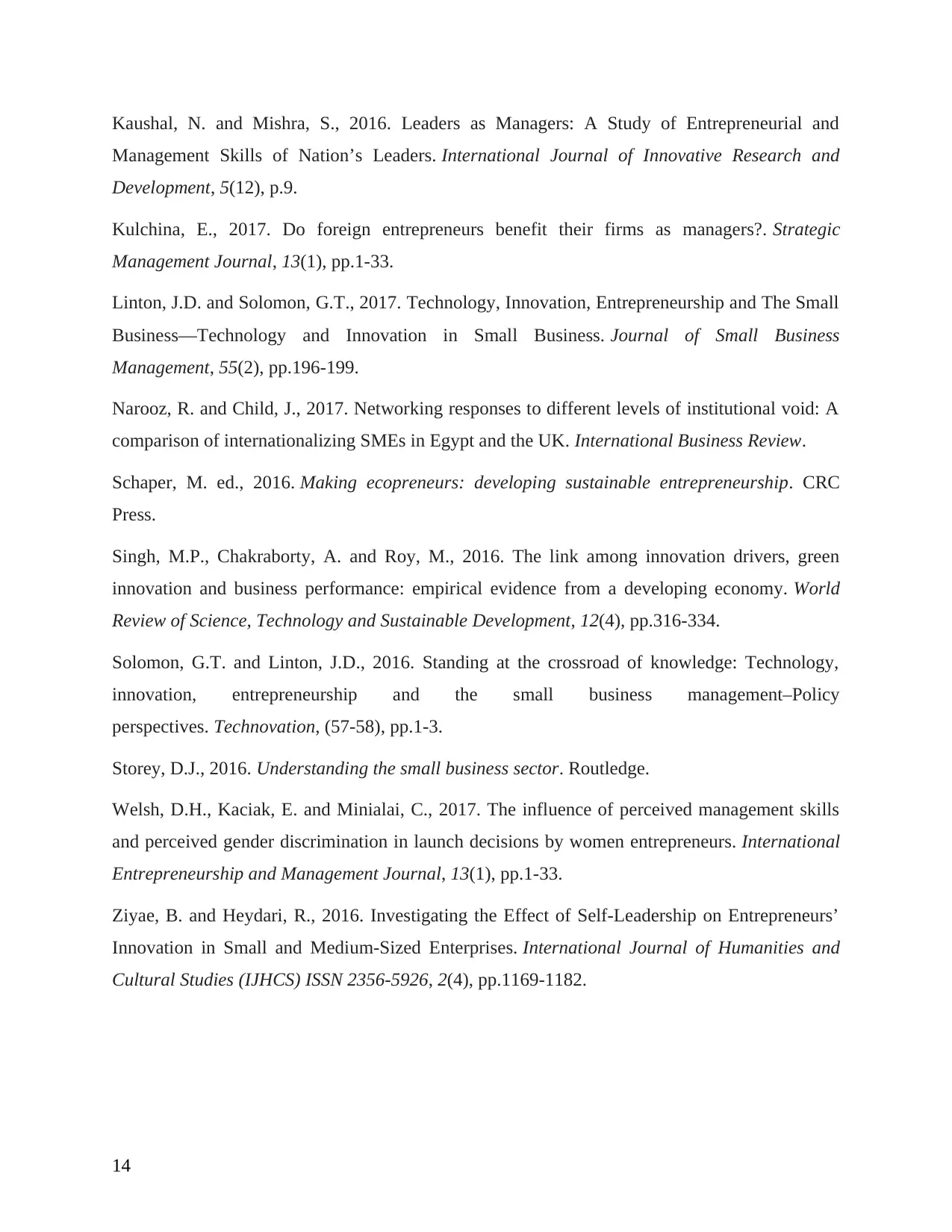
Kaushal, N. and Mishra, S., 2016. Leaders as Managers: A Study of Entrepreneurial and
Management Skills of Nation’s Leaders. International Journal of Innovative Research and
Development, 5(12), p.9.
Kulchina, E., 2017. Do foreign entrepreneurs benefit their firms as managers?. Strategic
Management Journal, 13(1), pp.1-33.
Linton, J.D. and Solomon, G.T., 2017. Technology, Innovation, Entrepreneurship and The Small
Business—Technology and Innovation in Small Business. Journal of Small Business
Management, 55(2), pp.196-199.
Narooz, R. and Child, J., 2017. Networking responses to different levels of institutional void: A
comparison of internationalizing SMEs in Egypt and the UK. International Business Review.
Schaper, M. ed., 2016. Making ecopreneurs: developing sustainable entrepreneurship. CRC
Press.
Singh, M.P., Chakraborty, A. and Roy, M., 2016. The link among innovation drivers, green
innovation and business performance: empirical evidence from a developing economy. World
Review of Science, Technology and Sustainable Development, 12(4), pp.316-334.
Solomon, G.T. and Linton, J.D., 2016. Standing at the crossroad of knowledge: Technology,
innovation, entrepreneurship and the small business management–Policy
perspectives. Technovation, (57-58), pp.1-3.
Storey, D.J., 2016. Understanding the small business sector. Routledge.
Welsh, D.H., Kaciak, E. and Minialai, C., 2017. The influence of perceived management skills
and perceived gender discrimination in launch decisions by women entrepreneurs. International
Entrepreneurship and Management Journal, 13(1), pp.1-33.
Ziyae, B. and Heydari, R., 2016. Investigating the Effect of Self-Leadership on Entrepreneurs’
Innovation in Small and Medium-Sized Enterprises. International Journal of Humanities and
Cultural Studies (IJHCS) ISSN 2356-5926, 2(4), pp.1169-1182.
14
Management Skills of Nation’s Leaders. International Journal of Innovative Research and
Development, 5(12), p.9.
Kulchina, E., 2017. Do foreign entrepreneurs benefit their firms as managers?. Strategic
Management Journal, 13(1), pp.1-33.
Linton, J.D. and Solomon, G.T., 2017. Technology, Innovation, Entrepreneurship and The Small
Business—Technology and Innovation in Small Business. Journal of Small Business
Management, 55(2), pp.196-199.
Narooz, R. and Child, J., 2017. Networking responses to different levels of institutional void: A
comparison of internationalizing SMEs in Egypt and the UK. International Business Review.
Schaper, M. ed., 2016. Making ecopreneurs: developing sustainable entrepreneurship. CRC
Press.
Singh, M.P., Chakraborty, A. and Roy, M., 2016. The link among innovation drivers, green
innovation and business performance: empirical evidence from a developing economy. World
Review of Science, Technology and Sustainable Development, 12(4), pp.316-334.
Solomon, G.T. and Linton, J.D., 2016. Standing at the crossroad of knowledge: Technology,
innovation, entrepreneurship and the small business management–Policy
perspectives. Technovation, (57-58), pp.1-3.
Storey, D.J., 2016. Understanding the small business sector. Routledge.
Welsh, D.H., Kaciak, E. and Minialai, C., 2017. The influence of perceived management skills
and perceived gender discrimination in launch decisions by women entrepreneurs. International
Entrepreneurship and Management Journal, 13(1), pp.1-33.
Ziyae, B. and Heydari, R., 2016. Investigating the Effect of Self-Leadership on Entrepreneurs’
Innovation in Small and Medium-Sized Enterprises. International Journal of Humanities and
Cultural Studies (IJHCS) ISSN 2356-5926, 2(4), pp.1169-1182.
14

15
1 out of 15
Related Documents
Your All-in-One AI-Powered Toolkit for Academic Success.
+13062052269
info@desklib.com
Available 24*7 on WhatsApp / Email
![[object Object]](/_next/static/media/star-bottom.7253800d.svg)
Unlock your academic potential
© 2024 | Zucol Services PVT LTD | All rights reserved.





